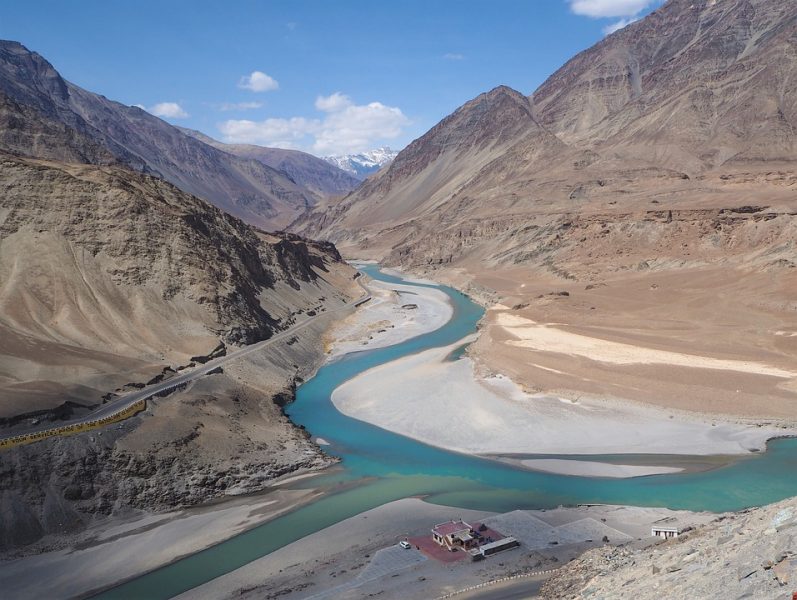
Demand to renegotiate Indus Water Treaty with Pakistan. Know why

A parliamentary standing committee has recently urged the Government of India to renegotiate the Indus Water Treaty (IWT) with Pakistan, as climate change and environmental impact assessment (EIA) issues are missing in the original 1960 treaty. This is the first formal attempt by India to raise questions over the basic structure of IWT, citing environmental and climate change issues.
The Indus Water Treaty is a UN-recognised trans-boundary water-sharing agreement between India and Pakistan signed by the two countries in 1960 for sharing the waters of the Indus basin. Under this treaty, Pakistan was allocated the waters of the Indus and its westward flowing tributaries, the Jhelum and Chenab, while India was given exclusive rights over the eastern rivers Ravi, Beas and Sutlej. The treaty between India and Pakistan is considered a success story in water diplomacy, more so for its survival despite the other conflicts between the two countries.
The two south Asian neighbours have frequently held talks following disagreements over water-sharing. But, climate change and environmental impact assessment have so far not been reasons for demanding re-negotiating or reviewing the 1960 treaty. This is the first time in the past 60 years that India has felt the need for re-negotiating the treaty.
The parliamentary standing committee submitted its report earlier this month urging the government to initiate the process for renegotiating the treaty with Pakistan. “Present-day pressing issues such as climate change, global warming and environmental impact assessment etc. were not taken into account by the treaty. In view of this, there is a need to re-negotiate the treaty so as to establish some kind of institutional structure or legislative framework to address the impact of climate change on water availability in the Indus basin and other challenges, which are not covered under the treaty,” the committee has observed in its report.
“Hence, the Committee urges the Government of India to take necessary diplomatic measures to renegotiate the Indus Water Treaty with Pakistan,” noted the committee while also stating that, “the Government of India should examine the feasibility of making maximum use of the provisions of the Indus Water Treaty, in terms of full utilisation of all accessible water of the eastern rivers and maximum utilisation of the irrigation and hydropower potential of the western rivers, including permissible water storage as per the provisions of the treaty.”
Is a review of the IWT possible?
Ashok Swain, Director, Research School for Water Cooperation, Uppsala University, Sweden, said that the treaty needs a review in view of climate change-related uncertainties. But, he added, that the whole Indus basin needs to be looked at as a single unit for the best possible use of the river water.
He said that the renegotiation of IWT is possible only when both the parties, India and Pakistan, agree to do so. “Without the consent of both the parties, no renegotiation of the treaty is possible. The new water demands in the basin ask for the renegotiation as the 1960 treaty is not a water-sharing treaty, it is primarily a partition of the river system – three rivers given to Pakistan and the rest three given to India,” he told Mongabay-India.
There is very little in the treaty for the best possible use of the water resources of the river system, he said. “But, the renegotiation will be possible only when both the parties see benefits from it.”
River Jhelum in Srinagar. It is one of the rivers in Indus basin. Photo by Athar Parvaiz.
Also read: Did the Indus Valley civilisation speak an ancient form of Tamil?
Pakistani environmental lawyer, Ahmad Rafay Alam, who also specialises in water and natural resources issues, said that renegotiation of the treaty at this point doesn’t seem possible. “The political stances taken by the present governments against one another is not the atmosphere in which environment concerns can be grafted into the Treaty. Islamabad and Delhi are not speaking with one another,” he said.
He also argued that Afghanistan and China being the co-riparians of Indus basin, also have a stake in the basin. “Modern water law suggests basins are best managed with all stakeholders cooperating,” he told Mongabay-India. “However, it’s unlikely India will allow multilateral negotiations with countries other than Pakistan. This is because India has maintained a policy of bilateralism with Pakistan since the Simla Agreement of 1972.”
A. K. Gosain of the Indian Institute of Technology-Delhi argued that any treaty on water cannot afford to be static anymore on account of various issues such as pressures of increasing demands and also on account of the implications of climate change.
The societies of the river basins, Gosain said, shall be required to cope with the implications of climate change on water resources. Like Swain and Alam, he also said that transboundary countries can be better off tackling water issues collectively. “Things around water resources are so complex that invariably they were never completely understood when the treaties were formulated. As the scientific knowledge becomes better, revisions might be needed and renegotiations may be inevitable,” he said adding that it remains to be seen whether renegotiating the Indus Water Treaty will become a reality or not.
(The story first appeared on Mongabay)

